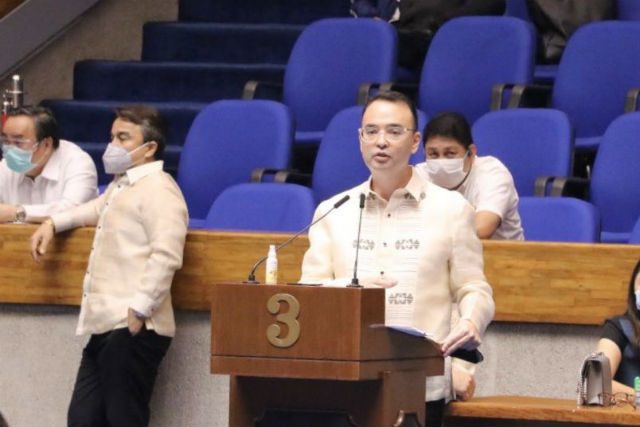SUMMARY
This is AI generated summarization, which may have errors. For context, always refer to the full article.

MANILA, Philippines – Speaker Alan Peter Cayetano said including a provision that would allocate 10% of ABS-CBN’s paid advertisements for government use in the bill granting the network a provisional franchise was meant to ensure “equal protection” of the law among major broadcasting networks.
Cayetano said this as he sponsored House Bill (HB) No. 6732 during the plenary session on Monday, May 18, the same day lawmakers moved to recall the measure’s second reading approval and reopened the period of sponsorship and debates amid constitutionality issues.
“I’m willing to submit this to our legal. But may I just stipulate my personal stand that all franchises should have this if the argument is equal protection. The solution is not to take it out of this provision,” the Speaker said.
Cayetano was responding to lawyer turned lawmaker Rufus Rodriguez, who asked if the 10% paid ad provision in HB 6732 would violate Section 1, Article III of the 1987 Constitution, which states, “No person shall be deprived of life, liberty, or property without due process of law, nor shall any person be denied the equal protection of the laws.”
Rodriguez noted the said provision was not included in at least 3 laws passed by the 17th Congress in 2019 that granted the franchise renewal of 3 broadcast networks.
These are Republic Act (RA) No. 11339 for Cebu Broadcasting Company, RA 11193 for Malindang Broadcasting Network Corporation, and RA 11205 for The Deus Amor Est Broadcasting Inc.
But Cayetano said the 3 stations mentioned by Rodriguez, who represents Cagayan de Oro City’s 2nd district, are just regional or provincial stations.
In contrast, he said, recent laws that renewed the franchises of networks that operate nationwide – RA 10925 (GMA-7) passed in 2016 and RA 11320 (TV5) passed in 2018 – both require the stations to allot 10% of their paid commercials for government use.
“On the legal side, I think the gentleman from Cagayan de Oro will agree with me that equal protection of the law, the concept says that the law has to be equally applied to those who are similarly situated. In the franchises that you have mentioned, they are either radio, or if they are TV, they are regional or provincial,” Cayetano said.
Section 4 of RA 10925 and RA 11320 read: “Public service time referred herein shall be equivalent to 10% of the paid commercials or advertisements which shall be allocated based on the need to the executive legislative, judiciary, constitutional commissions, and international humanitarian organizations duly recognized by statutes.”
But before GMA-7 and TV-5’s franchise renewals, the franchises previously granted to them did not require the networks to allot 10% of paid commercials for government use.
GMA first got its franchise through RA 7252 in 1992, back when it was still called Republic Broadcasting System Inc. Nothing under the “Responsibility to the Public” provisions of the law required the network to dedicate a portion of ad placements to the government.
The same goes for TV-5, which first received its franchise from Congress in 1994 through RA 7831. Back then, TV-5 was still the ABC Development Corporation.
‘Great advantage to government’
On Monday, Cayetano said requiring networks to give a specific amount of ads would make it “easier and more pragmatic for [the] government to be able to reach the segments” of society who tune in to the shows.
Cayetano also said the 10% allocation would barely make a dent in the ad profits earned by a major network like ABS-CBN, which the National Telecommunications Commission ordered to shut down after its franchise expired on May 4.
“And lastly, if you look at the profits of our giant networks, the 10% will not affect their bottom line, will not affect their stock market prices, will not affect severely their income, but it will give a great advantage to the government to be able to communicate with our people directly,” the Taguig City-Pateros 1st District congressman said.
The Philippine government has its own broadcast station, People’s Television Network, which receives funding from the annual national budget. – Rappler.com
Add a comment
How does this make you feel?
There are no comments yet. Add your comment to start the conversation.